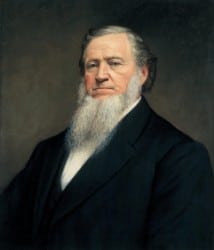
“But how are we to be made happy? There is one course—love the Giver more than the gift.”
| JD 9:31, Brigham Young, The Gifts of God, Etc.

“But how are we to be made happy? There is one course—love the Giver more than the gift.”
| JD 9:31, Brigham Young, The Gifts of God, Etc.

“You educate a man; you educate a man. You educate a woman; you educate a generation.”

“Education is the power to think clearly, the power to act well in the world’s work, and the power to appreciate life.”

“If I had a choice of educating my daughters or my sons because of opportunity constraints, I would choose to educate my daughters”

“When God speaks to the people, he does it in a manner to suit their circumstances and capacities…Should the Lord Almighty send an angel to re-write the Bible, it would in many places be very different from what it now is. And I will even venture to say that if the Book of Mormon were now to be re-written, in many instances it would materially differ from the present translation. According as people are willing to receive the things of God, so the heavens send forth their blessings.”

All who have lived on the earth according to the best light they had, and would have received the fullness of the Gospel had it been preached to them, are worthy of a glorious resurrection, and will attain to this by being administered for, in the flesh, by those who have the authority. All others will have a resurrection, and receive a glory, except those who have sinned against the Holy Ghost. It is supposed by this people that we have all the ordinances in our possession for life and salvation, and exaltation, and that we are administering in these ordinances. This is not the case. We are in possession of all the ordinances that can be administered in the flesh; but there are other ordinances and administrations that must be administered beyond this world. I know you would ask what they are. I will mention one. We have not, neither can we receive here, the ordinance and the keys of the resurrection. They will be given to those who have passed off this stage of action and have received their bodies again, as many have already done and many more will. They will be ordained, by those who hold the keys of the resurrection, to go forth and resurrect the Saints just as we receive the ordinance of baptism, then the keys of authority to baptize others for the remission of their sins. This is one of the ordinances we cannot receive here, and there are many more. We hold the authority to dispose of, alter and change the elements; but we have not received authority to organize native element, to even make a spear of grass grow.
| Journal of Discourses, p. 397

“It is our privilege and our duty to search all things upon the face of the earth, and learn what there is for man to enjoy, what God has ordained for the benefit and happiness of mankind, and then make use of it without sinning against him.”
| Journal of Discourses, 9:243

“I call evil inverted good, or a correct principle made an evil use of.”
| Journal of Discourses

Some were disposed to do right with their surplus property, and once in a while you would find a man who had a cow which he considered surplus, but generally she was of the class that would kick a person’s hat off, or eyes out, or the wolves had eaten off her teats. You would once in a while find a man who had a horse that he considered surplus, but at the same time he had the ringbone, was broken-winded, spavined in both legs, had the pole evil at one end of the neck and a fistula at the other, and both knees sprung.”
| Journal of Discourses, 2:306–7

“All that we possess and enjoy are the gifts of God to us, whether they be in earthly substance, physical constitution, or mental power; we are accountable to Him for the use we make of these precious gifts. … It is not our privilege to waste the Lord’s substance.”
| Journal of Discourses, 11:136.